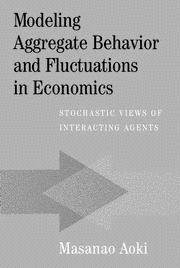Book contents
- Frontmatter
- Contents
- Preface
- 1 Overviews
- 2 Setting Up Dynamic Models
- 3 The Master Equation
- 4 Introductory Simple and Simplified Models
- 5 Aggregate Dynamics and Fluctuations of Simple Models
- 6 Evaluating Alternatives
- 7 Solving Nonstationary Master Equations
- 8 Growth and Fluctuations
- 9 A New Look at the Diamond Search Model
- 10 Interaction Patterns and Cluster Size Distributions
- 11 Share Market with Two Dominant Groups of Traders
- Appendix
- References
- Index
10 - Interaction Patterns and Cluster Size Distributions
Published online by Cambridge University Press: 15 October 2009
- Frontmatter
- Contents
- Preface
- 1 Overviews
- 2 Setting Up Dynamic Models
- 3 The Master Equation
- 4 Introductory Simple and Simplified Models
- 5 Aggregate Dynamics and Fluctuations of Simple Models
- 6 Evaluating Alternatives
- 7 Solving Nonstationary Master Equations
- 8 Growth and Fluctuations
- 9 A New Look at the Diamond Search Model
- 10 Interaction Patterns and Cluster Size Distributions
- 11 Share Market with Two Dominant Groups of Traders
- Appendix
- References
- Index
Summary
Large collections of agents form subgroups or clusters through their interactions. What kinds of distributions of their sizes can we expect to find? Size distributions have obvious implications for our economic analysis, as one example in the next chapter illustrates. In this chapter, we import results from the literatures of population genetics, probability, and combinatorial analysis to describe the Ewens sampling formula (multivariate Ewens distribution) and random mappings, and indicate some simple applications.
We first discuss the entry and exit rates of jump Markov processes associated with three classes of random combinatorial structures we use. They are called selections, multisets, and assemblies by Arratia and Tavaré (1994), and we use these names.
We then examine how agents in a large collection interact with each other and form clusters of various sizes. We derive stationary distributions for cluster sizes, and use them to draw statistical inferences on various aggregates, that is, macroeconomic variables. The Ewens sampling formula has not been used in economic analysis, but we think that it may find important applications there. The next chapter uses the joint densities for the order statistics of cluster sizes to discuss situations in which the largest two clusters of agents largely determine the market behavior. Related materials are found in Aoki (2000b,c).
Clustering processes
Consider modeling a large number of economic agents or units interacting in a market. The nature of the agents or units involved varies according to the context of the model.
Information
- Type
- Chapter
- Information
- Modeling Aggregate Behavior and Fluctuations in EconomicsStochastic Views of Interacting Agents, pp. 141 - 179Publisher: Cambridge University PressPrint publication year: 2001
